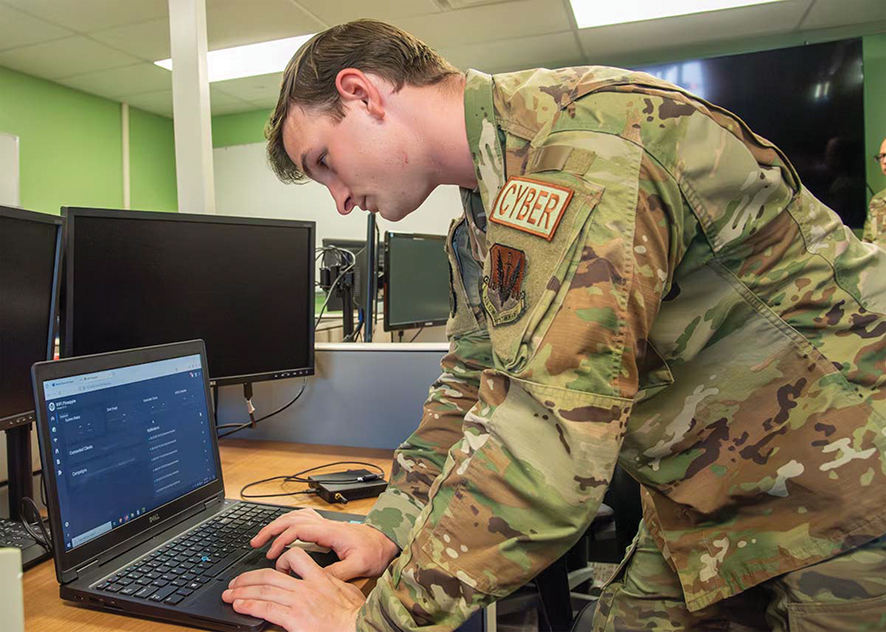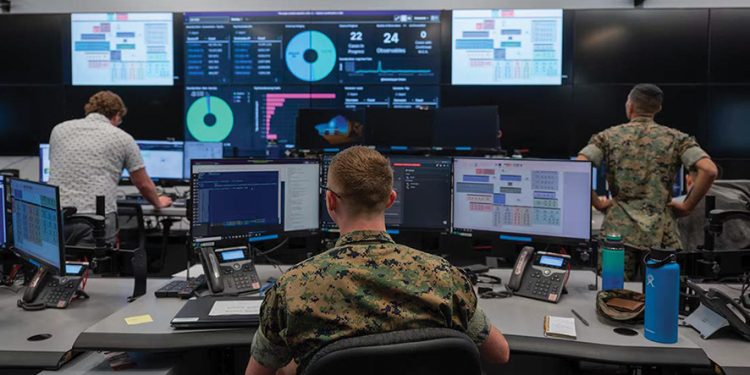The battlefield of the digital age has expanded beyond physical terrain to encompass cyberspace, presenting new challenges and opportunities for military forces worldwide. As cyber warfare becomes an increasingly prominent element of modern conflicts, military forces are grappling with a range of cybersecurity issues that threaten national security, operational integrity, and the safety of personnel.
This is particularly evident in the experiences of the Georgian Armed Forces and the Ukrainian Armed Forces, both of which have faced relentless cyberattacks from Russia. Through examining these cases, we can gain insight into the innovations and challenges that define cybersecurity in contemporary defense.
Cyber warfare tactics have evolved significantly, with state and non-state actors employing increasingly sophisticated methods to disrupt and damage military operations. For the Georgian and Ukrainian Armed Forces, cyberattacks have become a persistent threat that requires constant vigilance and adaptation.
In 2008, during the Russian invasion of Georgia, the Georgian Armed Forces were subjected to a coordinated cyberattack that paralyzed government websites and disrupted communications. This attack, considered one of the first instances of cyber warfare accompanying kinetic military operations, highlighted the vulnerabilities of digital infrastructure. The attackers used distributed denial-of-service (DDoS) attacks, defacing websites and spreading disinformation. These tactics not only hindered Georgia’s military response, but also sowed confusion and panic among the civilian population.
Ukraine has faced similar, if not more severe, challenges since the annexation of Crimea in 2014 and the ongoing invasion in Eastern Ukraine. Ukrainian military and government networks have been targeted by a series of cyberattacks attributed to Russian-backed hackers. Notable incidents include the 2015 and 2016 attacks on Ukraine’s power grid, which caused widespread blackouts and underscored the potential of cyberattacks to cause real-world harm. The malware used, known as BlackEnergy and Industroyer, demonstrated a high level of sophistication and the ability to target industrial control systems.
These examples illustrate how cyber warfare tactics have evolved to include not only disruptive attacks on websites and networks but also more destructive operations aimed at critical infrastructure. For military forces, this necessitates a comprehensive approach to cybersecurity that can defend against a wide range of threats.
In response to the growing cyber threat, military forces have been investing in and developing innovative cybersecurity measures. Both Georgia and Ukraine have made significant strides in enhancing their cyber defense capabilities, often with the support of international partners.
The Georgian Armed Forces, recognizing the importance of robust cybersecurity, have established a dedicated Cyber Security Bureau within the Ministry of Defense. This bureau is tasked with protecting military networks, conducting cyber threat analysis, and developing defensive strategies. In addition to strengthening internal capabilities, Georgia has also benefited from collaboration with NATO and the European Union, which have provided training, resources, and expertise to bolster Georgia’s cyber defenses.

Ukraine, facing an even more dire cyber threat, has also made cybersecurity a top priority. The Ukrainian Armed Forces have developed specialized cyber units responsible for defending military networks and responding to cyber incidents. Ukraine has received substantial support from the United States and European countries, which have provided technical assistance, training, and advanced cybersecurity tools. One notable initiative is the Ukraine Cyber Defense Assistance Collaboration (UCDAC), a joint effort aimed at enhancing Ukraine’s cyber resilience through knowledge sharing and capacity building.
Technological innovation plays a critical role in these efforts. Advances in artificial intelligence (AI) and machine learning are being leveraged to detect and respond to cyber threats more effectively. AI-driven systems can analyze vast amounts of data to identify patterns and anomalies indicative of cyberattacks, enabling faster and more accurate threat detection. Additionally, the development of advanced encryption technologies helps protect sensitive military communications from interception and tampering.
The integration of these technologies into military cyber defense strategies represents a significant leap forward. However, it is essential to acknowledge that technology alone is not a panacea. Effective cybersecurity also requires well-trained personnel, robust policies, and a culture of security awareness within the military.
Indeed, while technological advancements are crucial, the human element and organizational challenges play an equally important role in cybersecurity. The Georgian and Ukrainian Armed Forces have both encountered difficulties related to training, coordination, and the integration of cyber defense into broader military strategies.
One major challenge is the shortage of skilled cybersecurity professionals. Both Georgia and Ukraine face a significant gap in the number of trained cyber experts relative to the scale of the threats they encounter. This shortage is exacerbated by the fact that skilled professionals are often lured away by higher salaries in the private sector. To address this issue, both countries have implemented programs to develop and retain cyber talent. In Georgia, initiatives like the Cyber Security Awareness Month aim to educate and train military personnel across all levels, while Ukraine has established cyber academies to cultivate a new generation of cyber defense experts.
Coordination between different branches of the military and government agencies is another critical challenge. Effective cyber defense requires seamless collaboration and information sharing, but bureaucratic hurdles and siloed structures can impede these efforts. For example, during the early stages of the conflict in Ukraine, there were significant challenges in coordinating cyber defense activities between the military, intelligence agencies, and civilian authorities. Recognizing this, Ukraine has since made efforts to improve interagency cooperation, including the establishment of the National Cybersecurity Coordination Center to streamline responses to cyber incidents.
Furthermore, integrating cyber defense into overall military strategy is a complex task. Cyber operations must be aligned with traditional military objectives and tactics, which requires a deep understanding of both domains. In Georgia, the integration of cyber defense into military exercises has become a priority, allowing for the testing and refinement of strategies in simulated environments. Similarly, Ukraine has incorporated cyber warfare scenarios into its military training programs, ensuring that personnel are prepared for the multifaceted nature of modern conflicts.
The experiences of the Georgian and Ukrainian Armed Forces underscore the critical importance of cybersecurity in modern defense. As cyber warfare tactics continue to evolve, military forces must adapt and innovate to protect their digital infrastructure and maintain operational integrity. The challenges they face, from technological sophistication to organizational coordination, highlight the complexity of the cyber domain.
Investing in advanced technologies, developing skilled personnel, and fostering international cooperation are all essential components of a robust cyber defense strategy. As the digital battlefield continues to expand, the lessons learned by Georgia and Ukraine will serve as valuable guideposts for other nations navigating the treacherous landscape of cyber warfare. The future of defense will undoubtedly be shaped by the ongoing struggle to secure the cyberspace that underpins our increasingly interconnected world.
By the team at Mercury Strategic
Defense Sector Review is an analysis of the regional and relevant security and defense issues by the team at Mercury Strategic Services, a defense consulting, training, and advisory company based in Tbilisi, Georgia and at www.mercstrat.com














